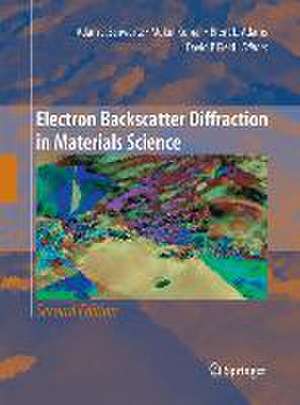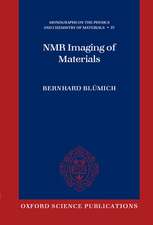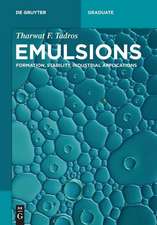Electron Backscatter Diffraction in Materials Science
Editat de Adam J. Schwartz, Mukul Kumar, Brent L. Adams, David P. Fielden Limba Engleză Paperback – 12 sep 2014
The text has been substantially revised from the first edition, and the authors have kept the format as close as possible to the first edition text. The new developments covered in this book include a more comphrensive coverage of the fundamentals not covered in the first edition or other books in the field, the advances in hardware and software since the first edition was published, and current examples of application of electron backscatter diffraction to solve challenging problems in materials science and condensed-matter physics.
| Toate formatele și edițiile | Preț | Express |
|---|---|---|
| Paperback (1) | 1216.10 lei 38-44 zile | |
| Springer Us – 12 sep 2014 | 1216.10 lei 38-44 zile | |
| Hardback (1) | 1379.81 lei 3-5 săpt. | +45.63 lei 6-10 zile |
| Springer Us – 12 aug 2009 | 1379.81 lei 3-5 săpt. | +45.63 lei 6-10 zile |
Preț: 1216.10 lei
Preț vechi: 1600.13 lei
-24% Nou
Puncte Express: 1824
Preț estimativ în valută:
232.73€ • 252.71$ • 195.49£
232.73€ • 252.71$ • 195.49£
Carte tipărită la comandă
Livrare economică 19-25 aprilie
Preluare comenzi: 021 569.72.76
Specificații
ISBN-13: 9781489993342
ISBN-10: 1489993347
Pagini: 428
Ilustrații: XXII, 403 p.
Dimensiuni: 193 x 260 x 22 mm
Greutate: 0.9 kg
Ediția:2nd ed. 2009
Editura: Springer Us
Colecția Springer
Locul publicării:New York, NY, United States
ISBN-10: 1489993347
Pagini: 428
Ilustrații: XXII, 403 p.
Dimensiuni: 193 x 260 x 22 mm
Greutate: 0.9 kg
Ediția:2nd ed. 2009
Editura: Springer Us
Colecția Springer
Locul publicării:New York, NY, United States
Public țintă
ResearchCuprins
Present State of Electron Backscatter Diffraction and Prospective Developments.- Dynamical Simulation of Electron Backscatter Diffraction Patterns.- Representations of Texture.- Energy Filtering in EBSD.- Spherical Kikuchi Maps and Other Rarities.- Application of Electron Backscatter Diffraction to Phase Identification.- Phase Identification Through Symmetry Determination in EBSD Patterns.- Three-Dimensional Orientation Microscopy by Serial Sectioning and EBSD-Based Orientation Mapping in a FIB-SEM.- Collection, Processing, and Analysis of Three-Dimensional EBSD Data Sets.- 3D Reconstruction of Digital Microstructures.- Direct 3D Simulation of Plastic Flow from EBSD Data.- First-Order Microstructure Sensitive Design Based on Volume Fractions and Elementary Bounds.- Second-Order Microstructure Sensitive Design Using 2-Point Spatial Correlations.- Combinatorial Materials Science and EBSD: A High Throughput Experimentation Tool.- Grain Boundary Networks.- Measurement of the Five-Parameter Grain Boundary Distribution from Planar Sections.- Strain Mapping Using Electron Backscatter Diffraction.- Mapping and Assessing Plastic Deformation Using EBSD.- Analysis of Deformation Structures in FCC Materials Using EBSD and TEM Techniques.- Application of EBSD Methods to Severe Plastic Deformation (SPD) and Related Processing Methods.- Applications of EBSD to Microstructural Control in Friction Stir Welding/Processing.- Characterization of Shear Localization and Shock Damage with EBSD.- Texture Separation for ?/? Titanium Alloys.- A Review of In Situ EBSD Studies.- Electron Backscatter Diffraction in Low Vacuum Conditions.- EBSD in the Earth Sciences: Applications, Common Practice, and Challenges.- Orientation Imaging Microscopy in Research on High Temperature Oxidation.
Notă biografică
Adam J. Schwartz is the Deputy Division Leader for Condensed Matter and High Pressure Physics in the Physics and Advanced Technologies Directorate. Dr. Schwartz joined LLNL as a post-doctoral research associate to investigate the systematics of displacive phase transformations after receiving his PhD from the University of Pittsburgh in 1991. His areas of interests focus on structure-propoerty-processing relations, aging and phase transformations in actinides; influence of microstructure and impurities on high-strain rate deformation behavior, texture and texture gradients in materials, intercrystalline defects and the role of grain boundary character distribution in materials, conventional and high resolution transmission electron microscopy, and electron backscatter diffraction. Dr. Schwartz has authored over 50 publications and has one patent.
Mukul Kumar joined as a staff scientist in the Materials Science and Technology Division in 1998 after completing a stint as a post-doctoral fellow at Johns Hopkins University. Prior to that, he received his PhD from the University of Cincinnati, where he was an Oak Ridge Institute for Science and Engineering Fellow and also received the ASM International Arthur Focke Award for his dissertation work. His areas of interest include the relationship between properties and microstructures, particularly as related to extreme environments encountered in turbine jet engine and nuclear reactor environments and high strain rate and pressure conditions; defect analysis using conventional transmission electron microscopy; and electron backscatter diffraction. Kumar has authored over 70 publications and has two patents.
Mukul Kumar joined as a staff scientist in the Materials Science and Technology Division in 1998 after completing a stint as a post-doctoral fellow at Johns Hopkins University. Prior to that, he received his PhD from the University of Cincinnati, where he was an Oak Ridge Institute for Science and Engineering Fellow and also received the ASM International Arthur Focke Award for his dissertation work. His areas of interest include the relationship between properties and microstructures, particularly as related to extreme environments encountered in turbine jet engine and nuclear reactor environments and high strain rate and pressure conditions; defect analysis using conventional transmission electron microscopy; and electron backscatter diffraction. Kumar has authored over 70 publications and has two patents.
Textul de pe ultima copertă
Electron backscatter diffraction (EBSD), when employed as an additional characterization technique to a scanning electron microscope (SEM), enables individual grain orientations, local texture, point-to-point orientation correlations, and phase identification and distributions to be determined routinely on the surfaces of bulk polycrystalline materials. The application has experienced rapid acceptance in metallurgical, materials, and geophysical laboratories within the past decade due to the wide availability of SEMs, the ease of sample preparation from the bulk, the high speed of data acquisition, and the access to complimentary information about the microstructure on a submicron scale.
This entirely new second edition describes the complete EBSD technique, from the experimental set-up, representations of textures, and dynamical simulation, to energy-filtered, spherical, and 3-D EBSD, to phase identification, in situ experiments, strain mapping, and grain boundary networks, to the design and modeling of materials microstructures. Numerous application examples including the analysis of deformation microstructure, dynamic deformation and damage, and EBSD studies in the earth sciences provide details of this powerful materials characterization technique.
This entirely new second edition describes the complete EBSD technique, from the experimental set-up, representations of textures, and dynamical simulation, to energy-filtered, spherical, and 3-D EBSD, to phase identification, in situ experiments, strain mapping, and grain boundary networks, to the design and modeling of materials microstructures. Numerous application examples including the analysis of deformation microstructure, dynamic deformation and damage, and EBSD studies in the earth sciences provide details of this powerful materials characterization technique.
Caracteristici
Brings together a collection of approximately 25 chapters written by experts in the field Provides everything a researcher needs to enter and succeed in the field of electron backscatter diffraction Includes a broad range of illustrative examples of the applications of electron backscatter diffraction to both materials science and condensed matter physics Revised to reflect changes in the field in the past seven years, including an entirely new section on fundamentals and new material on current examples of applications Includes supplementary material: sn.pub/extras






